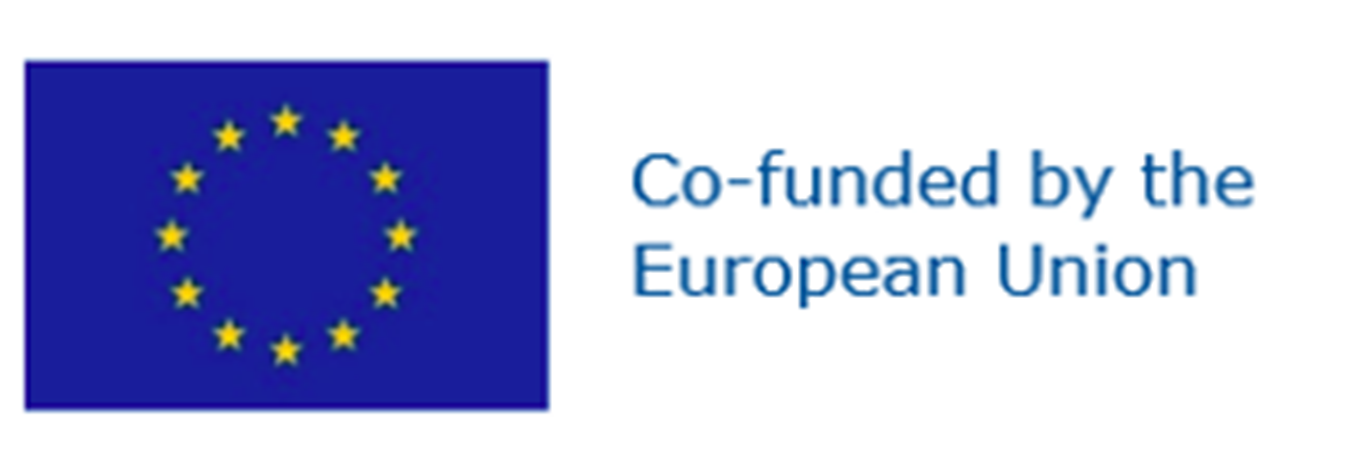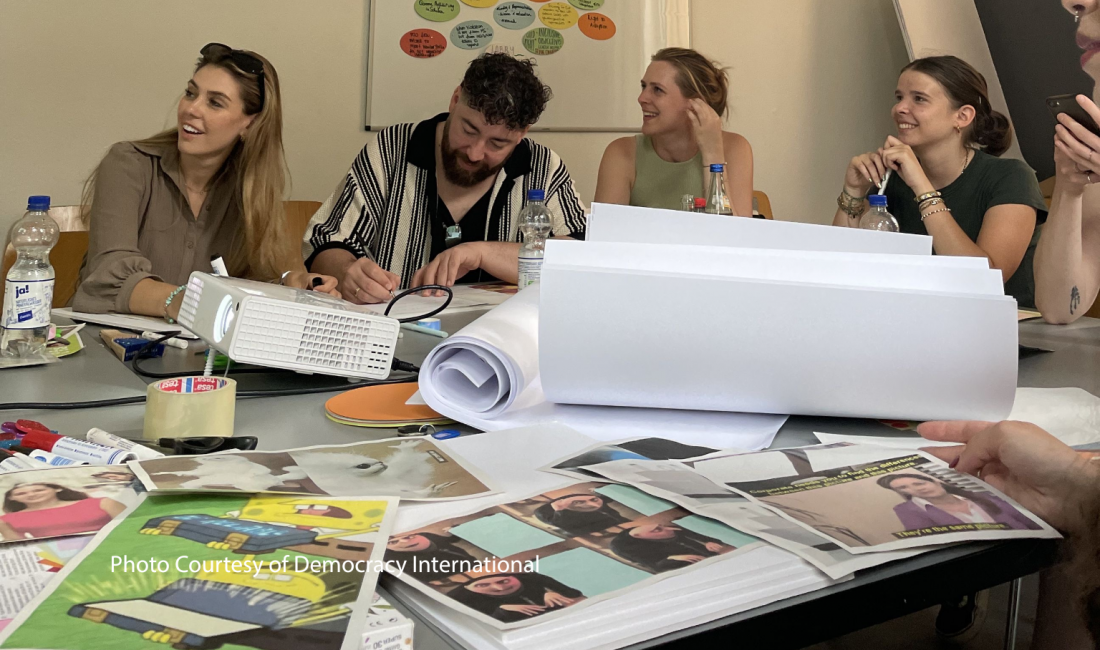As a component of the EU for Global Project, Democracy International hosted a Local Citizens' Panel in Cologne on June 25. The event "From ARTivism to policy: Creative resistance for LGBTQI+ rights" focused on the topics of representation and identity. Experts, youth, activists and artists came together to discuss the current developments of LGBTQI+ rights, and practised artistic forms of expression for democratic participation.
Context and Background
Despite having long been at the forefront of advancing rights— supported by an extensive EU Charter and robust anti-discrimination laws, and a general perception of being LGBTI-friendly compared to the global context, discrimination against the LGBTQI+ community in Europe persists. In fact, over the past decade, the situation has significantly deteriorated in several member states. The LGBTQI+ community has faced growing hostility, with policies increasingly targeting sexual and gender minorities.
Populist and homophobic movements are key drivers of this alarming trend. From the ban on Pride parades and the so-called "anti-propaganda" law in Hungary, to the declaration of "LGBTI-free zones" in Poland and restrictions on LGBTIQI+ "promotion" in Bulgaria, fundamental freedoms are under threat. The weaponisation of LGBTQI+ rights as a political tool has further exacerbated the situation. The Council of Europe has noted that hate speech and references to so-called "gender ideology" have become recurring themes in electoral campaigns across the region.
Civic Participation and Activism
In the context of the growing backlash against the LGBTQI+ community in Europe, events like 'From ARTivism to Policy' offer a crucial opportunity to engage citizens with tools that promote civic participation and the defence of fundamental human rights. During the event, the importance of political engagement was highlighted by German Member of the European Parliament, Lukas Sieper.
Acknowledging the challenging times and drawing from his personal and political journey— which includes founding a small political party and later running a campaign for the European Parliament— Lukas presented several practical avenues for political involvement. These included organising local networking events to foster community solidarity; leveraging social media to amplify marginalised voices and counter extremist narratives; and making use of democratic tools such as participation in local parties, demonstrations and petitions.
The Workshop
How can art help you in your activism?
This was the question that shaped the content and dynamics of the workshop "From ARTivism to Policy". Moderators from slam poetry, comics and meme culture, encouraged participants to explore creative activism as a way to become more civically engaged. Discussion and hands-on practice guided the three workshops offered to participants: slam poetry, storytelling/comics and memes/slogans.
Alyx Willems Lizano facilitated the storytelling/comics workshop, centred on the idea that any design can give life to a character capable of telling a story— and challenging harmful representations that reinforce stereotypes. Alyx encouraged participants to freely develop their own designs, offering keywords to spark their creativity. Their work ranged from portrayals of Mexican feminist activists to everyday people expressing emotion and lived experience, highlighting comics' power to tell meaningful stories.
Memes and posters are everywhere— they express key ideas in intelligent, often sarcastic, yet humorous ways, making them powerful artistic forms of expression for democratic participation.
Marcen Trey facilitated the memes and posters workshop, highlighting their power as modern forms of social commentary. Participants examined visual examples and learned how humour and irony can convey strong political messages. They developed posters that reflected concerns about democracy, human rights and social justice— combining creativity, critique and joy in equal measure.
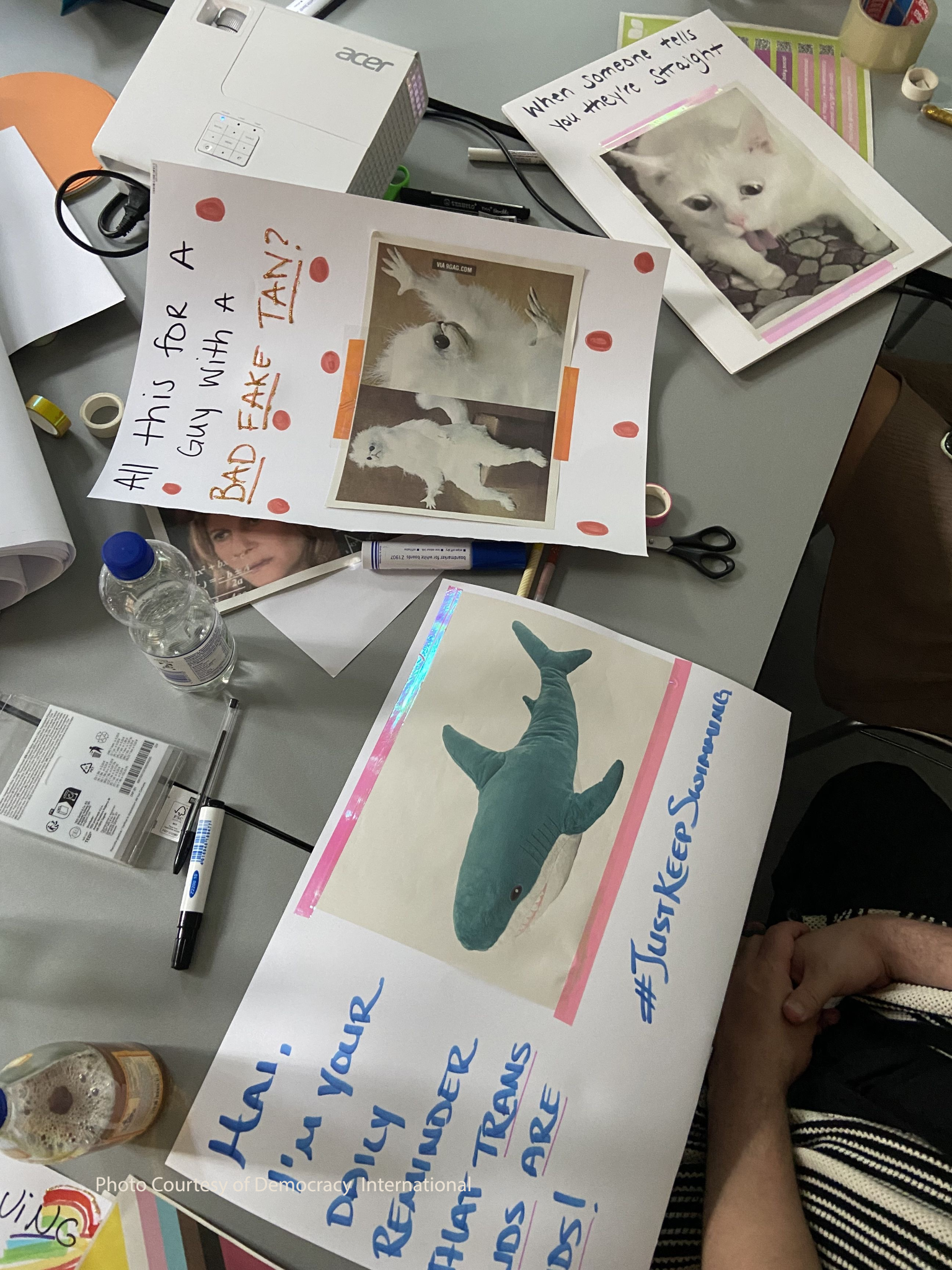
The slam poetry workshop, facilitated by Jana Göller, was divided into three parts: spontaneous writing without breaks, immerse yourself in a feeling while reading text, which was guessed by the others, and collaboratively creating a slam piece on queer allyship. Participants shared personal LGBTQI+ experiences in a safe, supportive space that Jana created. Her empathetic guidance, writing tips and feedback fostered deep, creative expression.
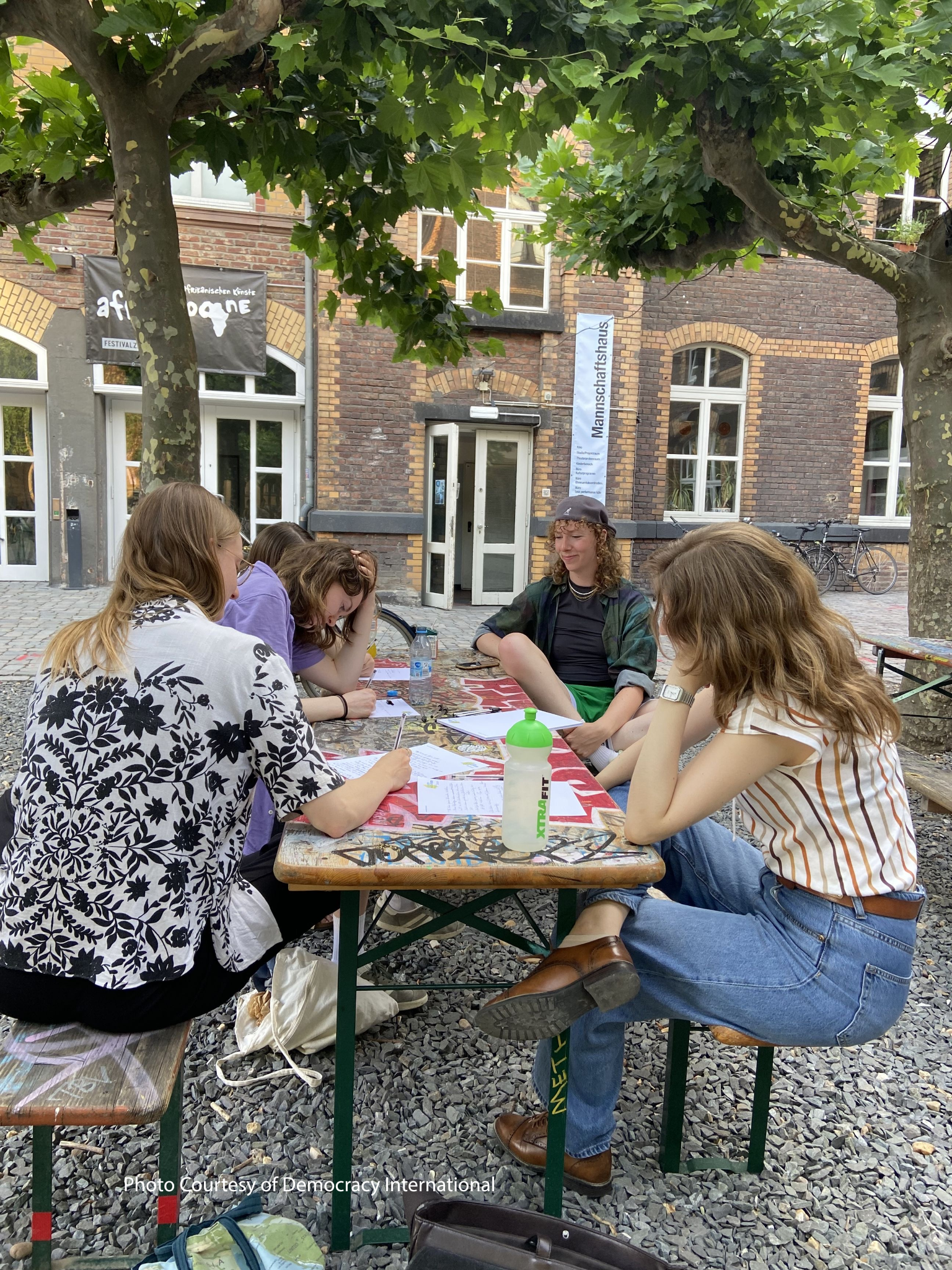
Discussions on Recommendations
The workshops revealed how art can serve both as a tool for personal expression and as a force for political change. Through group discussions, participants reflected on current challenges in Europe and proposed policy ideas for protecting human rights and LGBTQI+ communities. Many emphasised the significant role the European Union plays in upholding human rights norms. As a result, participants recommend expanding the EU's competences to include binding regulations on human rights for member states. Therefore, given the current climate of political polarisation, some participants also expressed concern about the effectiveness of existing mechanisms to protect EU values and institutions, calling for the development of more robust enforcement tools. Additional recommendations focused on the development of EU-wide affirmative action policies to protect persecuted LGBTQI+ individuals and activists. These should be integrated into broader strategies that combat hate speech, sexual, and gender-based violence, and to ensure a safe and protective environment for all.
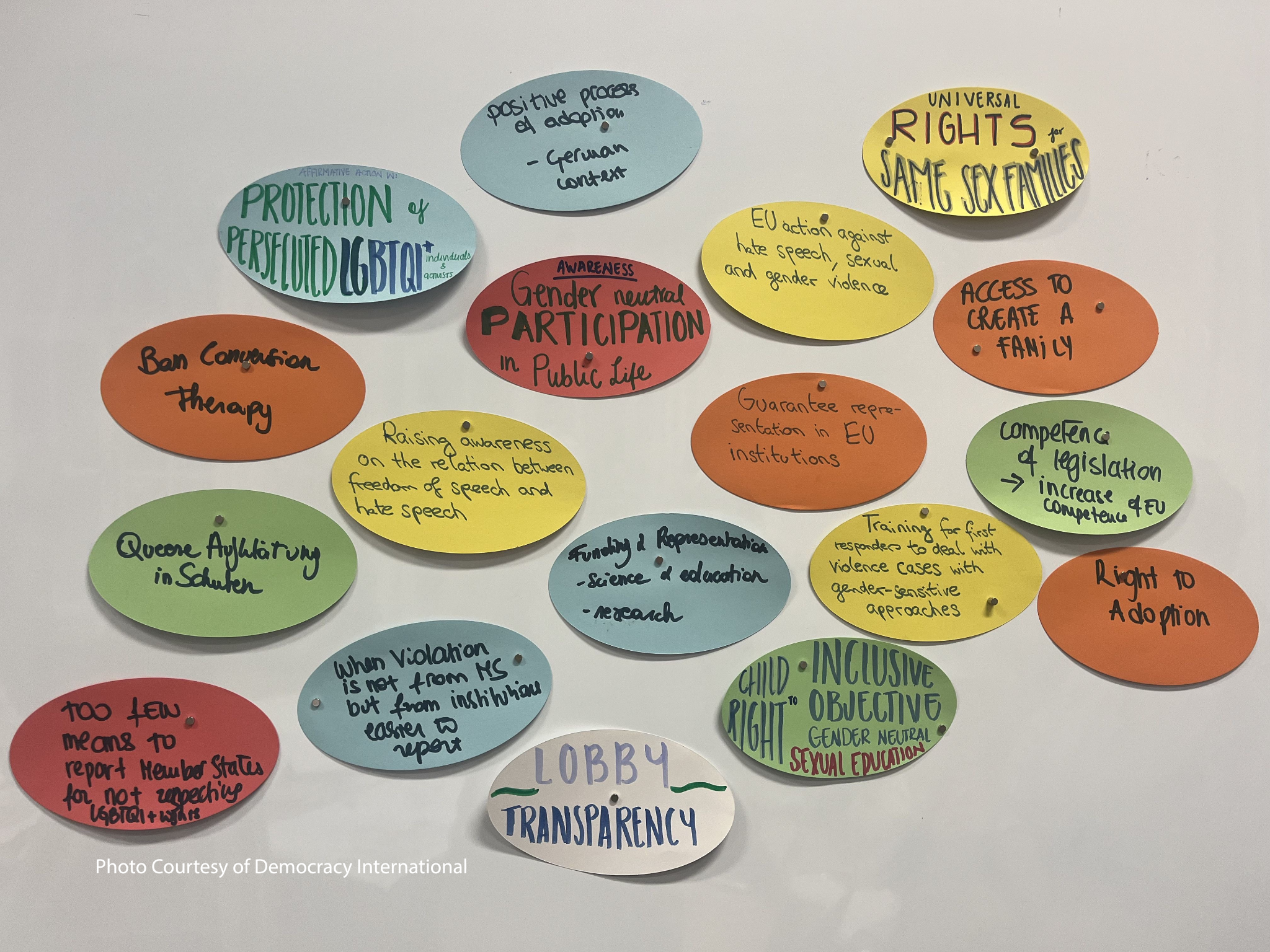
Another key issue raised was the need to establish an EU-level right to adoption for same-sex and queer couples—a matter currently within the competence of Member States and subject to national legislation and authorities. Likewise, participants called for more decisive action against policies that violate human rights, for instance, by enacting an EU-wide ban on conversion practices. In addition, the EU should adopt a global policy that acknowledges and advocates for the promotion and protection of LGBTQI+ rights beyond national borders.
As the recommendations illustrate, participants provide insightful policy ideas that have the potential to uphold human rights. A fundamental takeaway from the recommendations and lessons learned during the workshop is that these ideas do not need to be expressed solely in formal or legalistic terms— they can also be powerfully conveyed through artistic activism.
Political activism is often perceived as something structured, typically carried out by organisations with significant resources. However, the workshop "From ARTivism to Policy" reminds us of the opposite.
Every individual has the potential to create a meaningful political impact.
Art and its various forms of expression serve as powerful tools to communicate political ideas and to influence and transform the reality around us. The workshops and dialogues provided tools to engage in activism and defend individual rights and freedoms, with ingenuity and happiness. The event reinforced a fundamental truth:
Activism can be joyful, expressive and rooted in solidarity— and it belongs to everyone.
